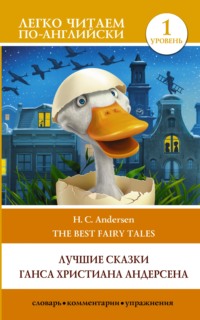H. C. Andersen best fairy tales / Лучшие сказки Г.Х. Андерсена. Уровень 1

Добавить В библиотекуАвторизуйтесь, чтобы добавить
Добавить отзывДобавить цитату
H. C. Andersen best fairy tales / Лучшие сказки Г.Х. Андерсена. Уровень 1
Вы ознакомились с фрагментом книги.
Для бесплатного чтения открыта только часть текста.
Приобретайте полный текст книги у нашего партнера:
Всего 10 форматов
Авторизация